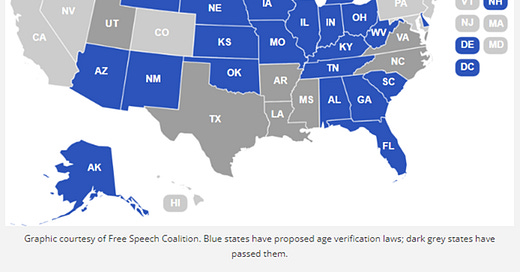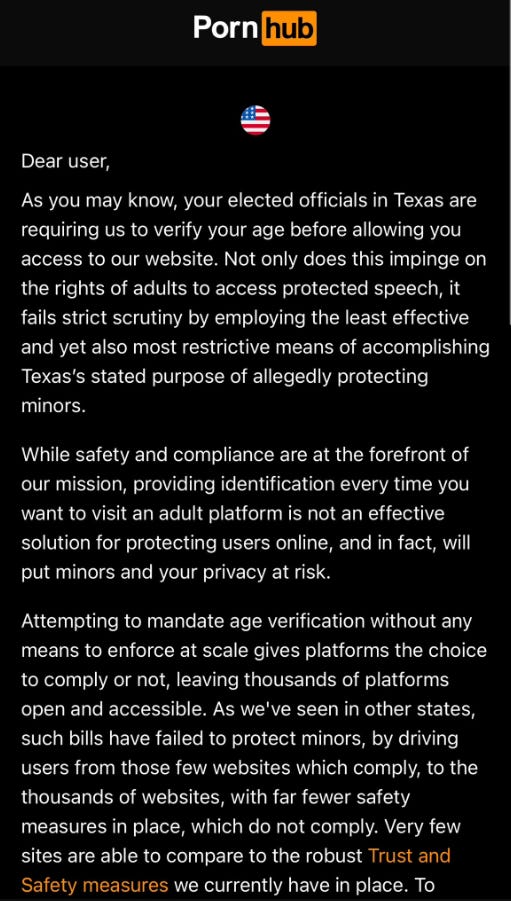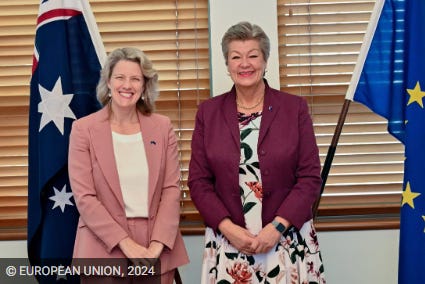The Digital Child Newsletter - 21st March
Big News:
Pornhub bans itself - and it looks like there’s more of that to come
One survey suggests that over 50% of British parents support a Smartphone ban for under 16s
TikTok is getting very mixed messages from across the continents
The Amereckoning:
Indiana became the 9th state requiring age verification for porn companies: Currently, 19 states, besides Indiana, hope to pass such legislation. Some bills have also addressed age restrictions on social media platforms.
Talking about banning: In a bit of a “switcheroo”, Pornhub has banned access to Texans, following an age verification law last Thursday. Pornhub criticized the law, arguing that it impinged on adults' rights and was an ineffective solution for child protection. Regardless, it now means that platforms can be fined up to $10,000 every day age verification technology isn’t used, and $250,000 if a child accesses obscene content due to lack of age checks. Here’s a snippet of Pornhub’s message.
Most parents support a Smartphone Ban for Under-16s: A recent survey conducted by the charity Parentkind showed that 83% of parents believe smartphones are harmful to children, with 58% supporting a ban. Advocates like Sophie Winkleman have called for “Brick” substitutes in their place.
"Smartphones and screen use are wrecking children’s eyesight, their neurological, emotional and mental health, their educational attainment and their life chances."
Sophie Winkleman
TikTok x Africa:
TikTok has partnered with the African Union Commission’s Women, Gender, and Youth Directorate (WGYD) to launch the #SaferTogether Campaign across Africa. The campaign combines in-app and on-ground activities to educate and engage communities on digital safety. Ironic considering the looming ban in the US (and possibly in the UK?).
Around the World:
UK:
Ofcom updates:
Unsure about age assurances: The Digital Trust & Safety Partnership (DTSP), backed by major tech companies like Google, Meta, Microsoft, and Apple, is concerned about Ofcom's age assurance guidance under the Online Safety Act in the UK. The DTSP emphasizes the need for industry-led initiatives and best practices. With its tagline of “promoting a safer and more trustworthy internet,” the group has come up with its own methodology for assessing and evaluating trust and safety practices based on internal assessments by companies.
We want effective outcome measures, not immeasurable buzzwords.
The inevitability of violence - for children: According to a recent study by Ofcom, children as young as primary school age are being exposed to violent online content, with social media and group chats being the primary channels. The study found all children interviewed had encountered adult-only content. Granted it was a survey of just 247 children, but this should not be “unavoidable”.
“Children should not feel that seriously harmful content - including material depicting violence or promoting self-injury - is an inevitable or unavoidable part of their lives online” Gill Whitehead, Ofcom online safety group director
…And the results of this? Another surge in child sextortion numbers has occurred. Latest data by the Internet Watch Foundation shows an eight-fold increase to 176 reports, up from the previous years 21.
"The devastation that sexual extortion can cause cannot be overstated, and it is heart-breaking to see the number of cases continuing to rise. Children are not at fault here and we want them to know that there is support available to help them get through this harrowing experience."
Susie Hargreaves OBE, Chief Executive Officer, Internet Watch Foundation
It’s on a big scale and small scale: This piece in the Guardian is a sad story about one reality of what unsupervised and unprepared online access could lead to for more teens.
Simply all we need is the same rules applying online as they do offline. It’s a bit like this, the first case of convicted cyber-flashing in the UK.
"Just as those who commit indecent exposure in the physical world can expect to face the consequences, so too should offenders who commit their crimes online; hiding behind a screen does not hide you from the law."
Hannah von Dadelzsen, Deputy Chief Crown Prosecutor for CPS East of England
Well said, Hannah.
EU:
EU-Australia update: EU Commissioner for Home Affairs, Ylva Johansson, wrapped up talks with Australia on a variety of security issues, including child sexual abuse. This meant meeting with Julie Inman Grant, the e-safety commissioner.
"It's time that we stop treating tech companies like teenagers. They have grown up, and we need to treat them that way. They have to be responsible for what they do – and what they aren't doing."
Commissioner Ylva Johansson
New Zealand:
Pushing the onus onto parents: Advocacy groups and government agencies are pushing for stronger regulations and heightened parental awareness to protect children. Currently, voluntary efforts and educating parents seem to be the biggest measure of safety, not Government legislation.
Australia:
A new code to combat content: Australia has enacted a new industry code aimed at search engine providers like Google and Bing to combat the dissemination of abusive and illegal material, particularly AI generated content. Effective as of Tuesday, it obliges companies to take measures to mitigate such content. Julie is back again, and smashing it:
"The commencement of the search engine code is really significant as it helps ensure one of the key gateways to accessing this material, through online search engines, is closed."
eSafety Commissioner Julie Inman Grant
UAE:
The quality of digital life in the UAE has improved: This week the Prime Minister of Dubai shut down 160,000 websites and social media accounts for various illegal and “unfavourable” habits. Its’ a good display of what a government can do if it wishes.
Singapore:
The conversation continues: Singapore has previously implemented measures such as the Code of Practice for Online Safety and parental guides to mitigate risks from harmful online content. This piece discusses what more stringent measures could be put in place to keep the internet safe for kids in Singapore.
The piece also displayed a uniquely optimistic response to the question of AI and safety:
“The emergence of AI holds promising prospects for enhancing children's internet safety. Tech companies can harness AI to develop innovative safety features, including robust age verification methods, content filters and threat detection algorithms, tailored to the unique needs of young users.”
Let us not forget how useful a tool it can be!
Maryland:
Another bill passed to protect the children: With all the porn swirling around, it’s easy to forget the problems of data collection and targeted ads. This new bill should restrict tech’s access to a minor’s data and prevent manipulative ad targeting. A great move.
Top Tweets:
Michael Adkison on X: "#New: Pornhub, one of the largest adult entertainment websites, has completely shut down services in Texas.










